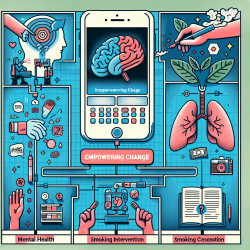Introduction
As practitioners in the field of mental health and addiction therapy, we are constantly seeking innovative and effective methods to support our clients. The study "Effectiveness of a telephone-based intervention for smoking cessation in patients with severe mental disorders: study protocol for a randomized controlled trial" provides a promising avenue for enhancing our practice. This research highlights the potential of telephone-based interventions, or "quitlines," as a tool for smoking cessation among individuals with severe mental disorders. Let's explore how this approach can be integrated into our practice and the benefits it offers.
The Power of Telephone-Based Interventions
Telephone-based interventions, commonly known as quitlines, have been shown to be effective in the general population for smoking cessation. However, their application in mental health settings has been limited. This study focuses on a proactive quitline intervention tailored specifically for individuals with severe mental disorders. The intervention includes psychological and psychoeducational support, as well as pharmacological treatment advice when necessary, over a 12-month period.
The study's findings suggest that this approach can significantly increase smoking abstinence rates, enhance motivation to quit, and improve self-efficacy among participants. For practitioners, this means a new tool in our arsenal to support clients in overcoming nicotine addiction, which is often a significant barrier to overall mental health and well-being.
Implementing Telephone-Based Interventions in Practice
To effectively implement telephone-based interventions in your practice, consider the following steps:
- Training: Ensure that your team is trained in delivering telephonic interventions. This includes understanding the unique needs of individuals with mental disorders and how to provide tailored support.
- Integration: Incorporate quitline services into your existing treatment plans. This can be done by collaborating with existing quitline services or establishing an in-house system.
- Follow-Up: Regular follow-up calls are crucial to maintaining engagement and monitoring progress. Set up a schedule for consistent check-ins with clients.
- Evaluation: Continuously evaluate the effectiveness of the intervention. Collect data on smoking cessation rates, client satisfaction, and overall mental health outcomes to refine your approach.
Encouraging Further Research
While this study provides a strong foundation, further research is essential to fully understand the potential of telephone-based interventions in mental health settings. Practitioners are encouraged to contribute to this growing body of knowledge by conducting their own studies or collaborating with research institutions.
Key areas for further exploration include:
- The long-term impact of quitline interventions on mental health outcomes.
- The effectiveness of different intervention components (e.g., motivational interviewing, cognitive-behavioral strategies).
- The role of technology in enhancing quitline services, such as the use of mobile apps or online platforms.
Conclusion
The study "Effectiveness of a telephone-based intervention for smoking cessation in patients with severe mental disorders" offers valuable insights into how we can better support our clients in achieving smoking cessation. By integrating telephone-based interventions into our practice, we can empower individuals with severe mental disorders to overcome nicotine addiction and improve their overall quality of life.
To read the original research paper, please follow this link: Effectiveness of a telephone-based intervention for smoking cessation in patients with severe mental disorders: study protocol for a randomized controlled trial.










